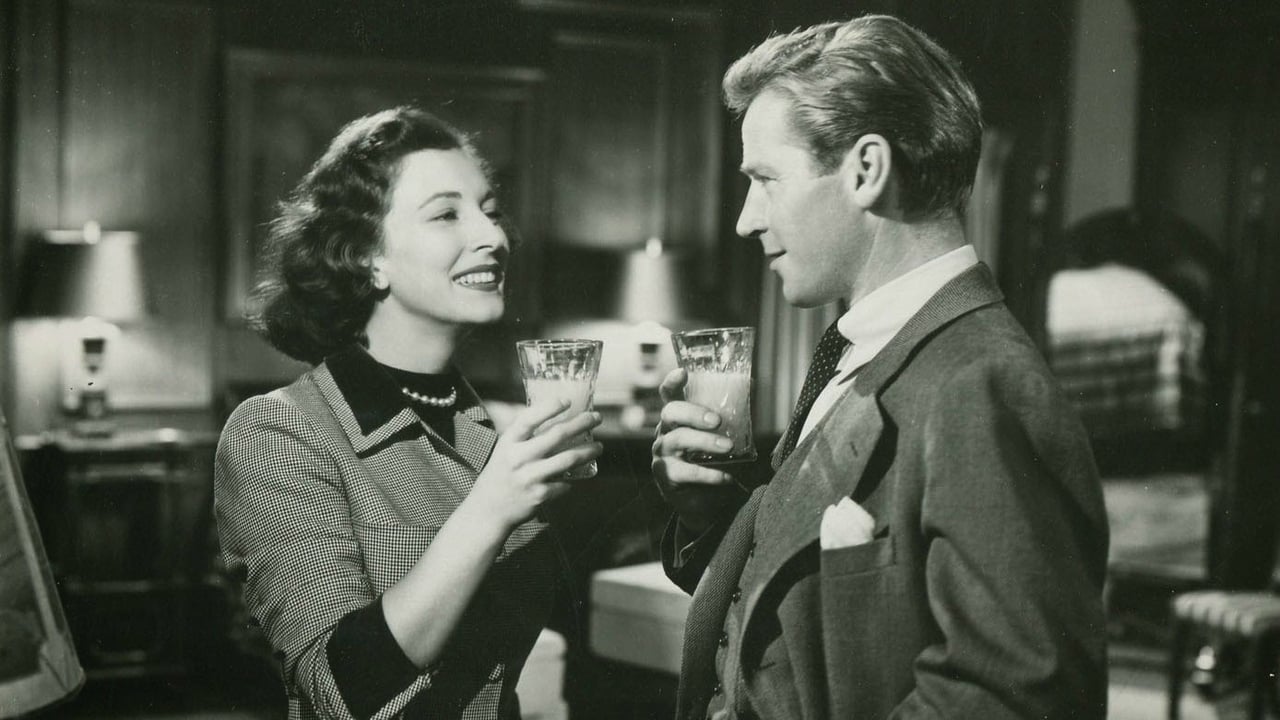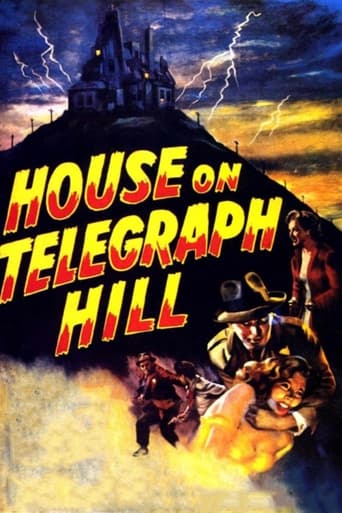

Everyone seems to like Valentina Cortese's performance, and while she's believable as a wide-eyed concentration camp survivor arriving in America, it's Richard Basehart who steals the show. I've only ever known him from his TV show in the 60s and his goofy role in La Strada, but for the duration of this film he quietly ratchets up his character from an initially charming but cool demeanor to a full-blown psychotic foaming at the mouth about making forty dollars a week, and Karin/Victoria realizes she never escaped the camp, she just traded one monster for another. Towards the end, he attaches himself to her like a barnacle. She can't even use the phone or have some alone time, which seems amusing in an age where most women would tell their husband to scram.You might think the scenes from Telegraph Hill are forced perspective, but it really is that steep, one false move and you're cartwheeling all the way down to the bay.Well, it's not Vertigo, but it does keep you on the edge of your seat. There is a happy ending, Karin/Victoria has a son to care for, a potential male suitor, and she's loaded. Not bad for a Polish country girl.
... View MoreThough based on a novel, "The House on Telegraph Hill" looks like a mash-up of two famous Hitchcock flicks, with orange juice replacing milk. It's unlikely this was intentional, but it doesn't change the fact that "House" is annoyingly similar and much inferior to either of The Master's films.Robert Wise again demonstrates why he's such a profoundly mediocre director. The quality of his films seems to depend solely on the quality of the material he's working with. That's good -- he doesn't ruin good stuff -- but it's bad because he does little to enhance average (or worse) material. If there were ever a non-auteur director, Wise was it. (He even admitted to having no particular style.)"House" needs the director's help. The script does little to create suspense. Who is "good" and who is "bad"? Is Viktoria imagining things, or is she really in danger? The tale's final unraveling is so drawn-out and overwrought that it's hard not to laugh. As with Wise's "The Haunting", "House" is a suspense film remarkably lacking palpable tension.It's hard to believe Wise wasn't aware he was in Hitchcock territory, and he'd better be on his toes. But the result is little more than a soporific run-through of the script. Basehart's final revelation of his motives is drab, and seems to come out of left field (even though it's prefigured).The only good thing is Valentina Cortese's sympathetic and thoroughly convincing performance. If only everything else had been that good...
... View MoreHow'd we get in the mess we're in? We ignored films such as The House on Telegraph Hill and when we did see them, we forgot about them, or else we figured, 'awww, that's only in the movies'.Yeah. Right. Where'd Chandler get the ideas for his detective thrillers? From the newspapers, that's where. From life.This is a classic case of art imitating life. It's all here. The mansion, the poisonings, the phones left conveniently off the hook, and most tellingly, most tediously, as the crime syndicate known as "The Zecchino Estate Grifters" proved time and again, the predator always paints himself as The Victim and tars those whom he targets as The Villains. That they pull this tiresome old gag is one thing, but that people who should know better still fall for it is enough to...well, it's enough to make you understand why they still pull it, isn't it? Why innovate when last year's stale old gags work?The House on Telegraph Hill is an explicit Black & White blueprint as to the ways in which conniving, gutless, termites will kill anyone who stands between them and the riches they covet. It's also a fine object lesson in the ways in which, despite their endless repertoire of half-clever tricks, they inevitably they make fatal mistakes which topple them fall into the traps they so carefully set for others.Richard Basehart makes you want to bash his face, in The House on Telegraph Hill. He lies, he poses, he snivels and whines like a psychopath and plays The Victim at every turn. He falsely accuses his victims of trying to harm him. He follows his intended victims and turns up in front of them, every time they try to summon help.There's just something about his behavior that makes you want to bash his face, it's so bloody tediously predictable. Were this film set in our era, why I bet he'd even apply for a Restraining Order against his victims, and then sue them for Defamation, wouldn't he?Richard Basehart's character is waging war,a war against those who rightly inherit. It's war and he knows it. Eventually, his lovely intended victim knows it as well and rather than bash his face - which is just what he wants - she uses her mind to alert trusted friends and as well to restrain herself in face of his endless provocations.Why's she do that? So that in coming straight for her, he unintentionally falls straight into the trap he set for her. Sweet. Doubtless, he's convicted and sentenced to death.Mmm, mmm, mmm....can't you just hear the pellets dropping into the acid vat beneath the chair, and smell the gas, as he rocks back and forth in that nice round steel room they have up at Q known as, 'The Gas Chamber', the place to which all two-bit connivers who covet what belongs to others will inevitably go?A magnificent film which should be an integral part of the syllabus of every criminal justice curriculum.Paul Vincent ZecchinoCritic of Critical MassManasota Key, Florida24 April, 2011
... View MoreThe House on Telegraph Hill (1951)A very solid movie with a bit of a forced hand, and something like a familiar plot in new clothes. The key innovation is that it ties the horrors of a Nazi concentration camp to a conventional American melodrama, and has the lead woman taking on the identity of her best friend in the camps. It is filmed with precision and drama all the way through, and makes a visually strong statement, as well as one with the social message that the adjustments of Nazi victims and their survivors is really hard to fathom. It kludges along a little with a narrative fix to make the information clear and fast at the start, and get us to San Francisco, 1950.The leading character, played by Italian actress Valentina Cortese (though she might well be intended to be a Polish Jew, given her situation in the camp), is very strong, a somewhat awkward leading woman but different than some of the types populating post-war movies. I liked her increasingly, and her difference (as an actress) helps cement her difference (as a character) from her American friends. She deserves our sympathy, and overall she gets it. Oddly, that element of surviving a death camp six years after the liberation of a string of them in Europe from the Nazis, becomes less and less salient, so that when the woman's duplicity is brought up toward the end, the growing male protagonist brushes it off as just one of those things. He's right, really, but the fact that the woman returns and has to pretend to be a young boy's real mother is tough going, if you consider something like the truth of it. It's convenient that the surrogate mother figure, who has apparently done a pretty good job raising the kid, is also a meanie in good Hollywood caricaturing style. The other man in the story, the one who you expect to be on our leading lady's side, turns out to be weak, duplicitous, and a bit of pretty wash by the end.Robert Wise is one of those smart directors who seems to make something unique happen no matter what the material. And the odd angles to this story, even with the inevitable outcome, make it really good.
... View More